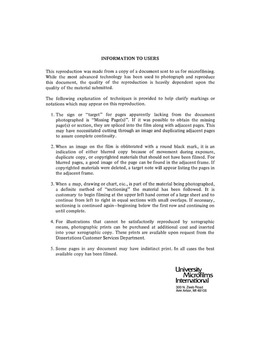| dc.contributor.author | Nixon, Sara Jo, | en_US |
| dc.date.accessioned | 2013-08-16T12:28:45Z | |
| dc.date.available | 2013-08-16T12:28:45Z | |
| dc.date.issued | 1982 | en_US |
| dc.identifier.uri | https://hdl.handle.net/11244/5035 | |
| dc.description.abstract | The proposed model is based on the principles of classical conditioning and as such focuses on the importance of spatial or temporal contiguity of contextual cues and list or task items and the reliability of these cues as predictors of list items as the foundation for the establishment of context-item associations and the resultant "context-effect." | en_US |
| dc.description.abstract | Recent literature has indicated that subjects who acquire information and are then tested for recall in the environmental context of original learning typically produce higher recall scores than those subjects who test in a new or different context. The current study includes a test of a model which is designed to predict and explain why the facilitation in same-context testing should occur and also when and why it should not occur. | en_US |
| dc.description.abstract | Data from Experiment 2, in which a 2-choice recognition test was used on the criterion task, did not yield the predicted interaction of acquisition and test room context on either the proportion of hits, correct rejections, false positives and misses or the reaction time data on these measures. Rather, the data indicated that subjects who engaged in the recognition test in an "enriched" environment performed substantially better than those who tested in a "deprived" environment. Potential reasons for these findings as well as a discussion of the implications and extensions of the model are also provided. | en_US |
| dc.description.abstract | Two studies were conducted utilizing the paired-associate paradigm and testing the effects of environmental context manipulations on response integration (Experiment 1) and response selection (Experiment 2). The findings of Experiment 1 in which poorer performance was predicted for same context subjects indicated that moderate degree of learning (DOL) subjects (8/16 response elicitations regardless of correctness) were more affected by contextual manipulations than either low (4/16) or high DOL (16/16) subjects. The predicted interaction of DOL and test room context on the elicitation of response "parts" in same-context conditions was demonstrated most clearly in an increased number of inversions and decreased number of omissions in the cued-recall of CCC trigrams for the moderate DOL group. | en_US |
| dc.format.extent | vi, 118 leaves : | en_US |
| dc.subject | Psychology, Experimental. | en_US |
| dc.title | Environmental cues and associative learning. | en_US |
| dc.type | Thesis | en_US |
| dc.thesis.degree | Ph.D. | en_US |
| dc.thesis.degreeDiscipline | Department of Psychology | en_US |
| dc.note | Source: Dissertation Abstracts International, Volume: 43-06, Section: B, page: 2023. | en_US |
| ou.identifier | (UMI)AAI8225512 | en_US |
| ou.group | College of Arts and Sciences::Department of Psychology | |
